ODA Topics 1
Revision of the Development Cooperation Charter
1. Changes in the Situation since 2015
Since the revision of the Development Cooperation Charter in 2015, many efforts have been made in order to address global issues through international cooperation, such as the adoption of the Sustainable Development Goals (SDGs) and entry into force of the Paris Agreement on climate change. On the other hand, the international order based on universal values has been severely challenged, led by Russia’s outrageous and illegal aggression against Ukraine, which makes it all the more urgent to realize the concept of a Free and Open Indo-Pacific (FOIP). Amid the COVID-19 pandemic seriously affecting the global economy and the international community, disruption of the global supply chain due to abrupt changes in the international situation, as well as cybersecurity issues arising from greater digitalization accelerated by the COVID-19 pandemic, have shown that the economy and security are directly linked, impacting each country.
With the world exposed to such uncertainty, developing countries face difficulties charting a path to stable development. Responses in accordance with the concept of human security are urgently needed as poverty reduction efforts have become less likely to be addressed and the food and energy crises have exacerbated humanitarian situations. At the same time, the division of roles played between the public and private sectors in development cooperation have changed, as is shown in the increase in the number of private sector and civil society initiatives to address challenges such as the SDGs and climate change.
2. Revision of the Development Cooperation Charter
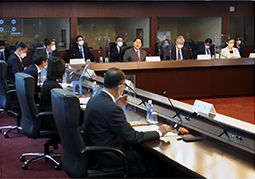
Second Meeting of the Advisory Panel on the revision of the Development Cooperation Charter
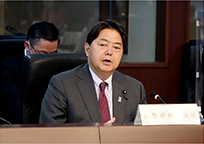
Foreign Minister Hayashi
Amid such great shifts in international situations, further enhancement of Japan’s “diplomatic capacity” is indispensable in order for Japan to continuously meet the expectations and trust placed on it by the international community, as well as to ensure Japan’s national interests such as peace and prosperity, while upholding universal values including freedom, democracy, human rights, and the rule of law. To that end, further utilization of ODA is required as one of the most essential diplomatic tools. In response to this, the Ministry of Foreign Affairs (MOFA) announced that the government would revise the Development Cooperation Charter in September 2022, and decided to establish the Advisory Panel on the revision of the Development Cooperation Charter, chaired by Mr. NAKANISHI Hiroshi, Professor at the Graduate School of Law, Kyoto University, under Foreign Minister Hayashi. Note 1
3. Advisory Panel Meetings
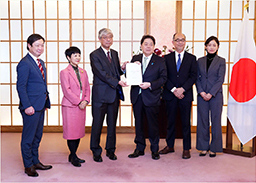
Submission of the report of the Advisory Panel on the revision of the Development Cooperation Charter to Minister Hayashi
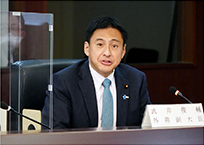
State Minister for Foreign Affairs Takei
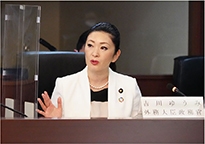
Parliamentary Vice-Minister for Foreign Affairs Yoshikawa
From September to November 2022, Advisory Panel meetings were held four times under Minister Hayashi, in which the members actively discussed such issues as the direction of development cooperation for the next 10 years, enhancement of the strategic use of ODA, principles for implementation, and financial and human resources for ODA implementation, among other matters. The report Note 2 summarizing the Advisory Panel discussions was submitted to Minister Hayashi in December 2022.
This report set out recommendations from the perspective of the further strategic utilization of ODA that meets the demands of today, in view of the changes in the international situation after the formulation of the current Charter. The report proposed to uphold three policies as the direction of development cooperation going forward, based on human security as the guiding principle: contributing to maintaining the international order based on universal values as the foundation for peace and prosperity; creating an environment of mutual help and co-creation, where Japan and the world develop and prosper together; and leading international efforts to addressing increasingly complex and serious global issues.
In addition, the report also proposed (1) strengthening cooperation with partners within and outside Japan, including like-minded countries, the private sector, and civil society; (2) increasing the flexibility of assistance methods through ODA; and (3) increasing the attractiveness of Japan’s development cooperation by leveraging its strength through “offer-type” cooperation. It further recommended that these efforts be backed by the setting of concrete paths to reach international goals over the next 10 years, such as achieving a 0.7% ODA to GNI ratio, which is an international goal.
Japan plans to formulate a new Development Cooperation Charter around the first half of 2023, taking into consideration the content of the report and broad public opinion.
Note 1: https://www.mofa.go.jp/press/release/press1e_000323.html
Note 2: https://www.mofa.go.jp/mofaj/files/100432142.pdf (in Japanese only)
